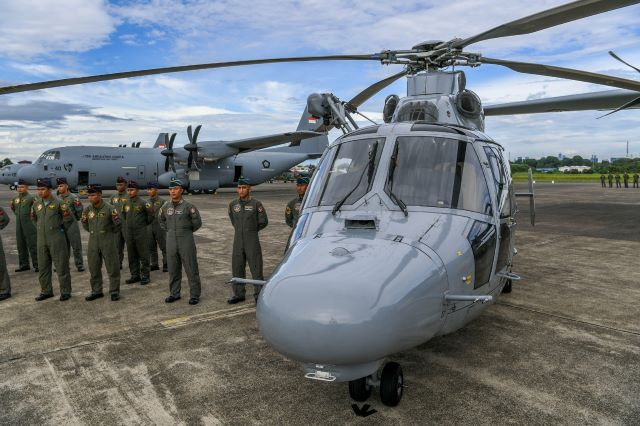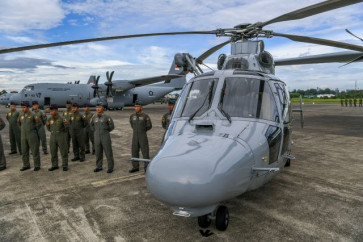Popular Reads
Top Results
Can't find what you're looking for?
View all search resultsPopular Reads
Top Results
Can't find what you're looking for?
View all search resultsDefense commitment: Between refocusing and rivalry
The Finance Ministry has emerged as the final hurdle in the budget approval process for the Defense Ministry, leading to unseen tensions between the two.
Change text size
Gift Premium Articles
to Anyone
 New strength: Navy personnel stand at ease near an AS565 MBe Panther helicopter to be officially handed over by Defense Minister Prabowo Subianto at Halim Perdanakusuma Air Base in East Jakarta on Jan 24, 2024. On the same occasion, the Air Force received a total of eight Airbus-made H225M choppers and five Lockheed Martin C-130 J Super Hercules transport aircraft. (Antara/Galih Pradipta)
New strength: Navy personnel stand at ease near an AS565 MBe Panther helicopter to be officially handed over by Defense Minister Prabowo Subianto at Halim Perdanakusuma Air Base in East Jakarta on Jan 24, 2024. On the same occasion, the Air Force received a total of eight Airbus-made H225M choppers and five Lockheed Martin C-130 J Super Hercules transport aircraft. (Antara/Galih Pradipta)
T
he presidential debate on Jan. 7 brought defense and foreign policy matters to the table, giving the public a deeper comprehension of the defense sector and the complexities of foreign policy, ranging from budgeting to future goals.
At the debate, presidential candidate Ganjar Pranowo questioned Prabowo Subianto, who is the incumbent defense minister, about a decline in several Indonesian defense indices. Ganjar highlighted that Indonesia's Global Peace Index for the military sector, as reported by the Institute for Economics and Peace, fell from 1,566 in 2022 to 1,457 in 2023. Additionally, Indonesia's Global Militarization Index, as measured by the Bonn International Centre for Conflict Studies, dropped from 95 in 2019 to 124 in 2023.
The Lowy Institute annual Asia Power Index for military capacity also downgraded Indonesia’s score from 14.9 in 2022 to 14.6 in 2023, placing the country 13th in the category of moderate military capabilities, behind other Southeast Asian nations like Vietnam (16.7) and Singapore (24.4).
Prabowo said the COVID-19 pandemic was to blame for the Indonesian military’s (TNI) lackluster performance. Moreover, all ministries have had their budgets refocused and reorganized in compliance with Finance Ministry Regulation No. 185/2020 as a response to the pandemic. The implementation of this refocusing policy went beyond mere budget reallocation, encompassing expenditures supported by the state budget, such as salaries, domestic and international travel and meeting packages. Furthermore, expenditure on services, assistance to the community that the president does not direct and capital expenditure that has not been contracted out are required to be the objects of budget reallocation.
In contrast, the expenditures contained in the Defense Ministry's strategic programs and budget allocations for Seven National Development Priority areas are exempt from the refocusing and reallocating policy.
One of the key national priorities for the Defense Ministry is enhancing political stability, legal frameworks and human rights in Indonesia. The ministry has subsequently taken steps to include the acquisition of defense equipment and infrastructure improvement in remote areas in its strategic plan, which is not part of the refocusing initiative.
In practice, the ministry allocated Rp32.68 trillion (US$2.06 billion) for the upgrade of defense equipment and infrastructure in 2022. Moreover, the ministry secured a foreign loan amounting to Rp15.85 trillion for TNI modernization. This situation indicates ample financial resources and should not meet significant issues with the implementation of refocusing.


















